This category has been viewed 173176 times
Healthy Indian Recipes > Sprouts
61 Sprouts Recipes

Table of Content
Best sprouts recipes | collection of Indian sprouts recipes |
Sprouts: The Living Food
Best sprouts recipes, collection of Indian sprouts recipes. In the search for nutrient powerhouses, sprouts have emerged victorious! Recognised as the true ‘living food’ and ‘Nature’s boon to mankind’, sprouts have added value to our diet since ancient times. Sprouts exemplify the amazing way in which nature works at continuing life.
We all know that when a plant produces seeds, it stores in them all the nutrients needed for the new plants to grow from them. These nutrients remain latent until germination occurs; and so, sprouting activates all these nutrients harnessing the full potential of the seed.
sprouts coconut salad recipe | sprouts salad with coconut | healthy mixed sprouts salad with coconut |
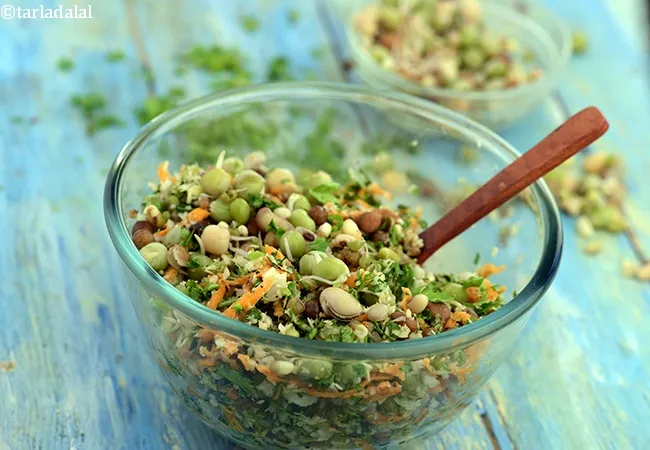 sprouts coconut salad recipe | sprouts salad with coconut | healthy mixed sprouts salad with coconut |
sprouts coconut salad recipe | sprouts salad with coconut | healthy mixed sprouts salad with coconut |
Health Benefits of Sprouting
The process of germination or sprouting brings about many remarkable changes in the seeds. Here are some ways in which sprouts are beneficial:
1. Easy to digest: Sprouting converts the complex nutrients stored in the seeds into a form that can be easily digested. In other words, the starch gets converted into simple sugars like glucose and fructose, proteins are broken down into amino acids and saturated fat gets converted into simple fatty acids. Sprouts also contain enzymes that aid digestion. In addition, sprouting destroys the seeds’ natural preservative enzymes that inhibit digestion. Try simple and quick recipes like Sprouts Stir-fry and Sprouts Pancakes.
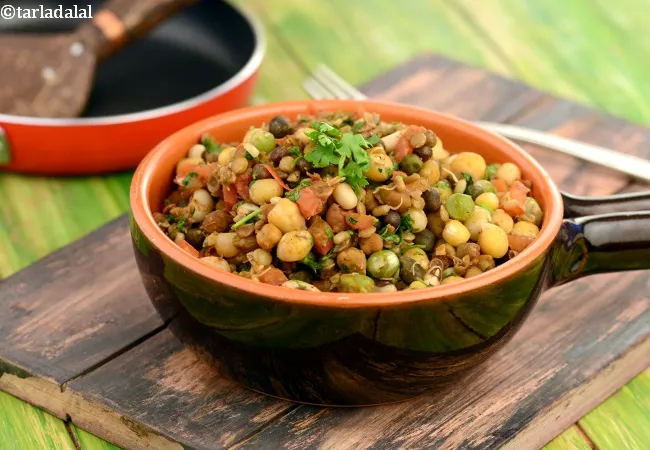 sprouts stir fry recipe | Indian style mixed sprouts sabzi | healthy sprouts vegetable sabji |
sprouts stir fry recipe | Indian style mixed sprouts sabzi | healthy sprouts vegetable sabji |
2. Ideal for dieters: The calorie content of the seeds decrease on sprouting as some amount of the carbohydrates and fats get converted into more easily digestible forms. Sprouts are a good source of fibre that binds extra fat and throws it out of the body. Besides this, when had as a salad in the form of Matki Salad or breakfast like Sprouts Dhokla, sprouts are very satiating, thereby keeping you away from impulsively snacking on high calorie foods.
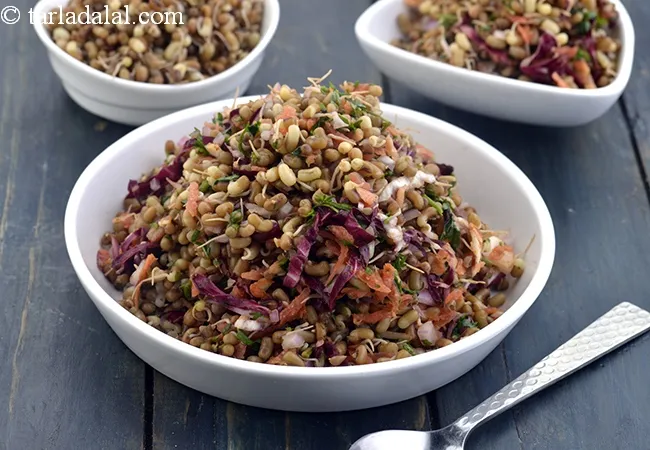 matki salad recipe | healthy sprouts salad | easy sprouts salad | how to make healthy moth bean salad recipe |
matki salad recipe | healthy sprouts salad | easy sprouts salad | how to make healthy moth bean salad recipe |
3. Contains extra proteins: Sprouting increases the availability of proteins. For example, on sprouting, the protein content of moong increases by 30%, i.e., 100 gms of unsprouted moong contains 24.9 gms protein, but on sprouting it increases to 32 gms.
The inactive enzymes present in the seeds also become active after sprouting thereby enabling easier digestion and absorption. Healthy Vegetable and Sprouts Lunch Salad is a one-dish meal which fulfills your protein requirement at one go. A serving provides 22.7 g of protein or try mixed sprouts wrap | mixed sprouts paneer wrap | healthy vegetable mixed sprouts wrap | mixed sprouts wrap has 14.9 grams protein (27% of RDA)
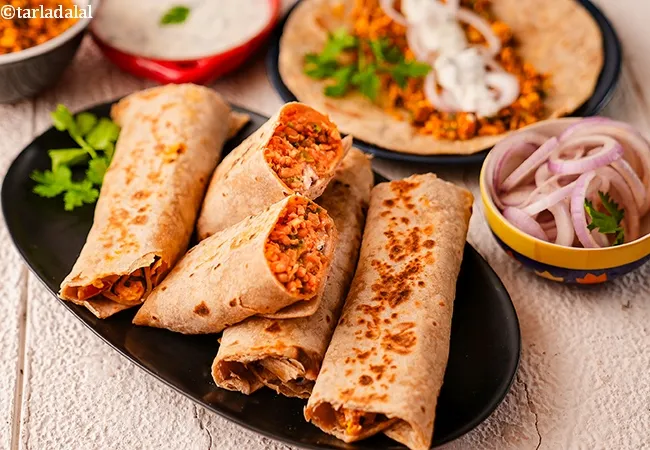 mixed sprouts wrap | mixed sprouts paneer wrap | healthy vegetable mixed sprouts wrap |
mixed sprouts wrap | mixed sprouts paneer wrap | healthy vegetable mixed sprouts wrap |
4. Provides a vitamin boost: On sprouting, the seed becomes a veritable nutrient factory with a greater concentration of Vitamin A, Vitamin C, Vitamin E, Vitamin K and B-complex. Some classic examples of this are Mixed Sprouts and Palak Subzi, Papaya Cabbage and Bean Sprouts Salad and Mixed Sprouts and Bajra Roti.
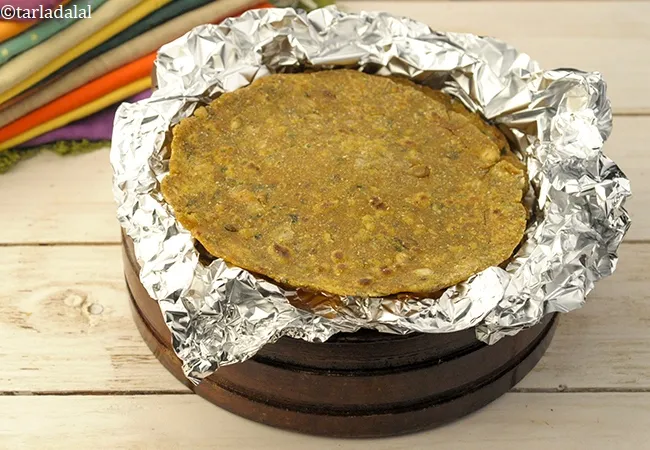 mixed sprouts and bajra roti recipe | bajra sprouts roti | easy sprouts roti | sprouts roti for weight loss |
mixed sprouts and bajra roti recipe | bajra sprouts roti | easy sprouts roti | sprouts roti for weight loss |
5. Easy to absorb, enhanced mineral content: Sprouting helps stored minerals like Iron, Calcium and Potassium to be absorbed easily as they are converted to their simple form. Try the recipe of Methi and Moong Sprouts Wrap.
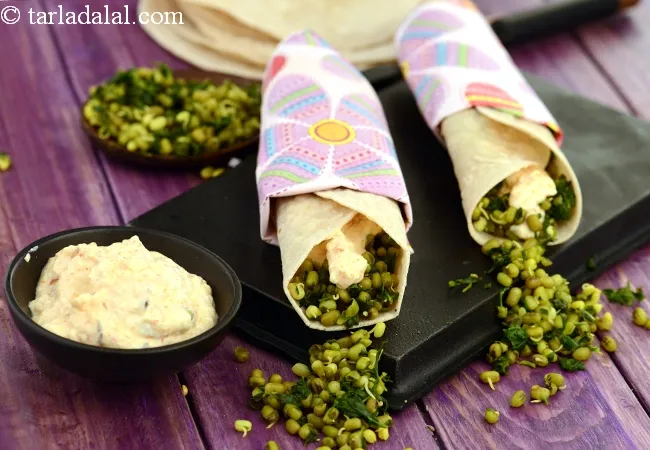 methi and moong sprouts wrap recipe | sprouted moong wrap | sprouted moong roll for weight loss | healthy Indian wrap for diabetes |
methi and moong sprouts wrap recipe | sprouted moong wrap | sprouted moong roll for weight loss | healthy Indian wrap for diabetes |
6. Fights diseases: Sprouting the seeds of Broccoli, Alfalfa and Brussels sprouts also increases the content of beneficial plant chemicals or compounds called phytochemicals, Antioxidants and bioflavonoids that help to prevent degenerative diseases like Cancer and Diabetes. Try the unique recipe ideas using brussels sprouts like Roasted Brussel Sprouts with Sea Salt and Beet and Sprouts Salad which makes use of alfa-alfa sprouts.
Beet and Sprouts Salad, Healthy Sprouted Beetroot Salad
9 Reasons why you should sprout
The nutritive value of seeds increase manifold on sprouting. Since the data on the same is not available we have used the values of raw seeds to calculate the nutritive values of the low calorie recipes.
| 1. | Energy (calories) | decreases by 15% |
| 2. | Carbohydrate content | decreases by 10% |
| 3. | Protein | increases by 30% |
| 4. | Vitamin A content | increases by 300% |
| 5. | Vitamin C | increases infinitely |
| 6. | Calcium content | increases by 35% |
| 7. | Potassium content | increases by 80% |
| 8. | Iron content | increases by 40% |
| 9. | Phosphorus content | increases by 55% |
5 ways to make the perfect Sprouts
While you will find a variety of sprouts available in the market these days, it is always better to sprout seeds at home to ensure complete hygiene. Also, when done at home you do not have to settle for commonly available legumes like Moong and Matki. Various other grains and cereals, such as those listed below, can also be sprouted:
• Grains like Wheat (gehun), Ragi/nachni (red millet), Bajra (black millet), Barley (jau), rye, Oats, Buckwheat, Horse gram (kulith), and Brown rice.
• Seeds like alfalfa and methi (fenugreek).
• Legumes like moong (whole green gram), chana (whole Bengal gram), Matki (moath beans), Hara vatana (dried green peas), Vaal (lima beans), and Red chana (black chick peas) etc.
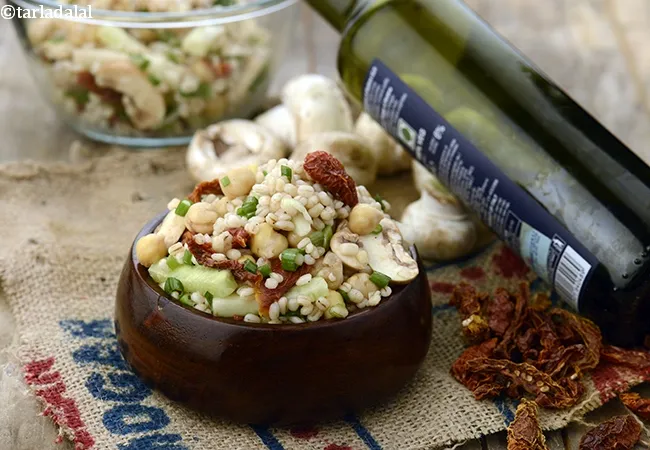 chick pea, vegetable barley salad with balsamic dressing | kabuli chana vegetable salad | healthy Indian barley salad with chickpeas | vitamin b1, b3, folic acid rich salad |
chick pea, vegetable barley salad with balsamic dressing | kabuli chana vegetable salad | healthy Indian barley salad with chickpeas | vitamin b1, b3, folic acid rich salad |
The process of sprouting does not require much effort and is very cost-effective. Here are some simple steps towards making the perfect sprouts:
1. Cleaning: Clean the seeds to remove any toxic chemicals. Remove any broken or damaged seeds before you begin the sprouting process. These seeds can rot and cause the sprouts to get an unpleasant smell.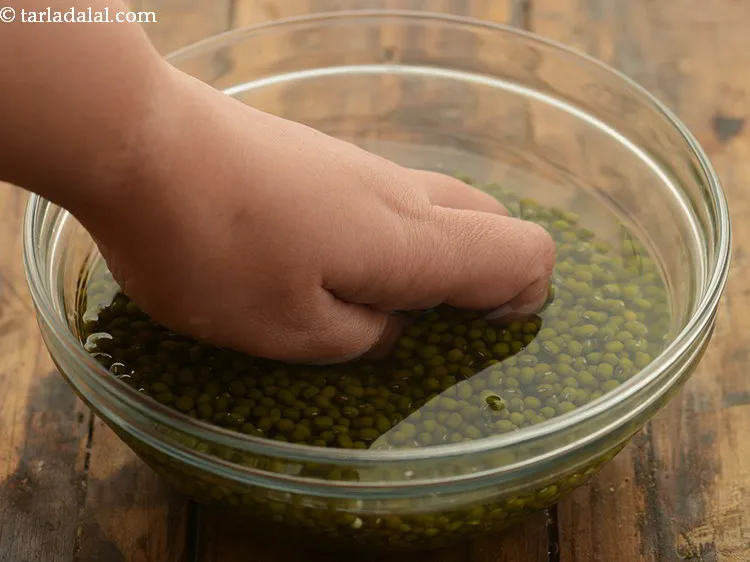
2. Soaking: Soak the seeds in water overnight. Next morning, drain off the water and rinse the seeds until the water runs clear. Seeds should be moist, but keeping them immersed in water will cause them to rot, hence drain the water completely.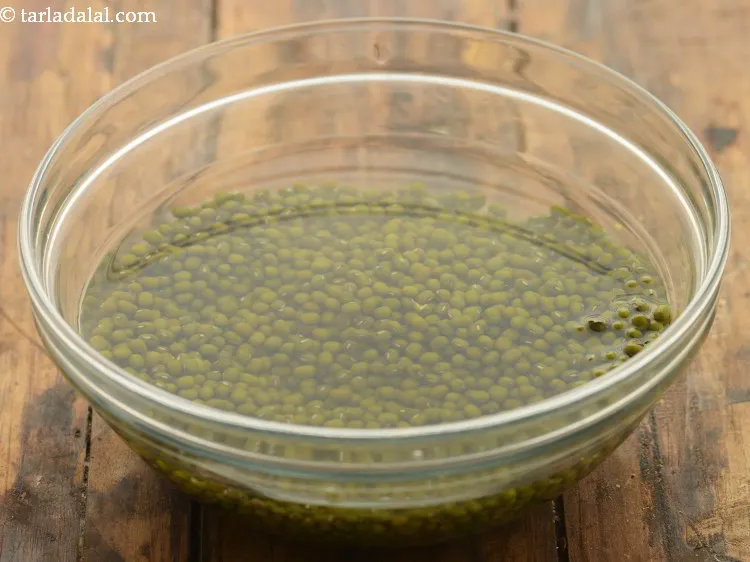
3. Sprouting: Spread the soaked seeds on a colander or a sieve and cover with a moist muslin/cotton cloth. Let the seeds sprout over a period of 8 to 16 hours (depending upon the seeds you use), refer to the table on for more information about different type of seeds.
Moderate warmth, water and air are very essential for proper sprouting. Do not keep the soaked seeds closeted. Ideally, room temperature is ideal for growing sprouts.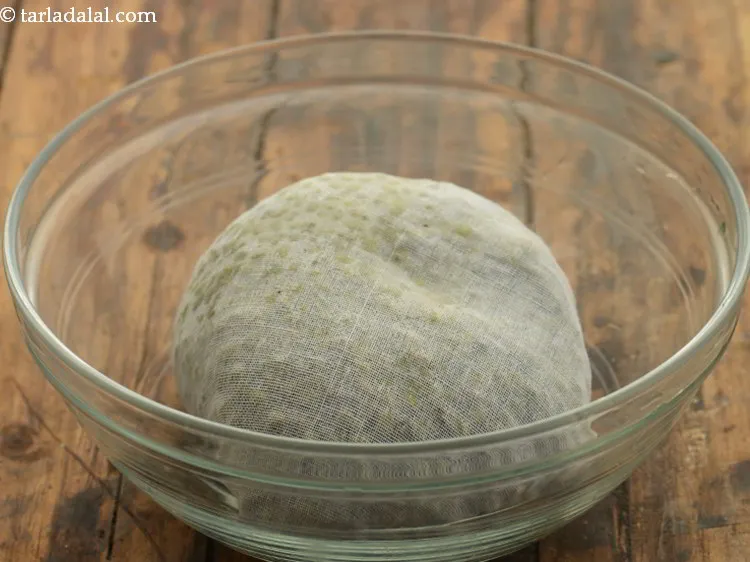
4. Rinsing : If you have used a colander, rinsing the sprouts twice a day ensures that they do not dry out and die. If you do not rinse, the sprouts will just become sour and useless even in cases where they don’t die! However, rinse the seeds delicately so as not to break the little shoots; once the sprouts begin to develop you might want to lightly shake them to remove excess water without breaking the shoots. Broken shoots will begin to rot or go mouldy, causing an unpleasant smell.
However, you might find a slight, pungent smell coming from the sprouts. You need not worry about this, as it is just caused by the by-products being produced while growing sprouts. However if you have used a muslin cloth and if the cloth seems dry, sprinkle some water over it.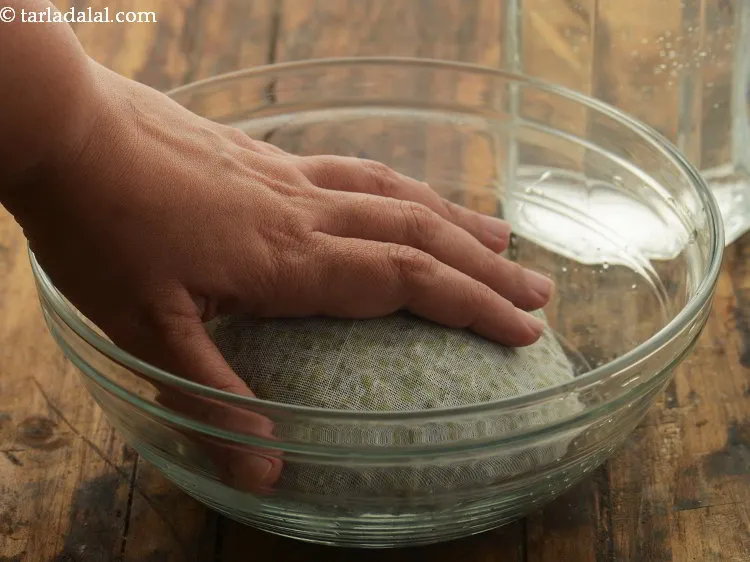
5. Storing: When your sprouts have grown to the desired length,open the muslin cloth, rinse them again, drain well and then put them in an airtight container and store in the refrigerator.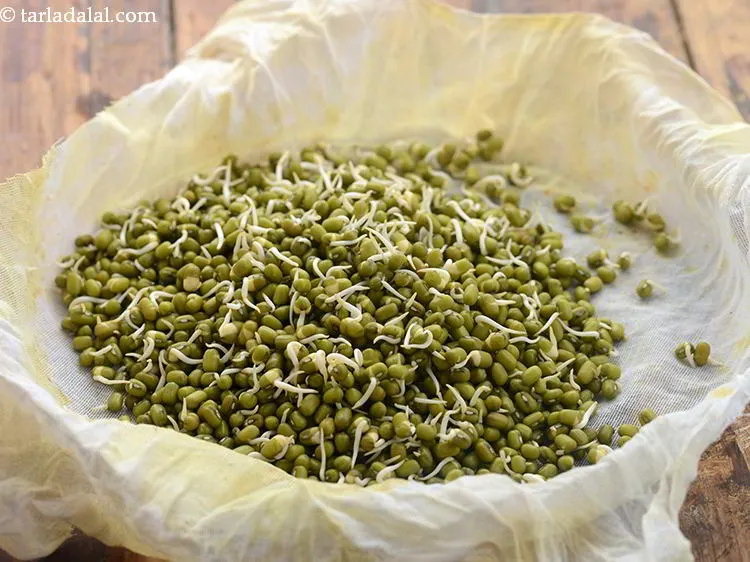
Note: After the sprouts reach their peak, they immediately begin to lose the vitamin C content. So, don't attempt to store sprouts for longer than a week. Only grow small quantities of sprouts that can be used within a short period of time. If you plan to consume sprouts on a regular basis to get substantial vitamins from them, it would be a good idea to have one or two small batches of sprouts growing all the time.
Here are some quick facts such as soaking time, sprouting time, quantities required and cooking method, which will help you get started with sprouts!
| Pulses (seeds) | Quantity (raw seeds) | Soaking time | Sprouting time | Makes (sprouts) | Cooking method |
|---|---|---|---|---|---|
| Matki (moath beans) | ½ cup | 8 to 10 hours | 6-8 hours | 2¼ cups | Add ½ cup of water and pressure cook for 1 whistle. |
| Vaal (lima beans) | ½ cup | Overnight | 8-10 hours | 1½ cups | Add ¾ cup of water and pressure cook for 2 whistles. |
| Chawli (cow peas/lobhia) | ½ cup | Overnight | 8 to 10 hours | 1½ cups | Add ½ cup of water and pressure cook for 2 to 3 whistles. |
| *Red chana (black chick peas) | ½ cup | Overnight | 12 to 15 hours | 1½ cups | Add ¾ cup of water and pressure cook for 3 whistles. |
| Hara vatana (dried green peas) | ½ cup | Overnight | 12 to 15 hours | 1½ cups | Add ¾ cup of water and pressure cook for 4 to 5 whistles. |
| * Kabuli chana (white chick peas) | ½ cup | Overnight | 24 to 26 hours | 1½ cups | Add ¾ cup of water and pressure cook for 3 to 4 whistles. |
| Safed vatana (dried white peas | ½ cup | Overnight | 24 to 26 hours | 1¼ cups | Add ¾ cup of water and pressure cook for 3 to 4 whistles. |
| *Rajma (kidney beans) Big/Small variety | ½ cup | Overnight | 24 to 26 hours | 1¼ cups | Add ¾ cup of water and pressure cook for 3 to 4 whistles. |
| Moong (whole green gram) | ½ cup | 8 to 10 hours | 6-8 hours | 1½ cups | Add ¾ cup of water and boil till cooked and all the water is evaporated. |
| Fenugreek (methi) seeds | ½ cup | Overnight | 6-8 hours | 1½ cups | Add ¾ cup of water and boil till cooked and all the water is evaporated. |
| Masoor (whole red lentil) | ½ cup | Overnight | 10 to 12 hours | 1½ cups | Add ¾ cup of water and pressure cook for 2 to 3 whistles. |
| Wheat (gehun) | ½ cup | Overnight | 12 to 14 hours | 1½ cups | Add 1 cup of water and pressure cook for 3 to 4 whistles. |
| Kulith (Horse gram) | ½ cup | Overnight | 10 to 12 hours | 1½ cups | Add ¾ cup of water and pressure cook for 2 to 3 whistles. |
| Mixed sprouts (red chana, chawli, moong, rajma etc.) | ¼ cup | Overnight | 10 to 12 hours | ¾ cup | Add ¾ cup of water and pressure cook for 3 to 4 whistles. |
* These pulses are slightly difficult to sprout as they take longer and release some foul smelling compounds hence take utmost care while sprouting them at home. Ensure you rinse them in between to remove the foul smell and discard the spoilt seeds if any.
There are certain sprouts like alfalfa and Chinese bean sprouts etc, which are neither easy nor economical to sprout at home; hence it is advisable to buy these readymade from the market.
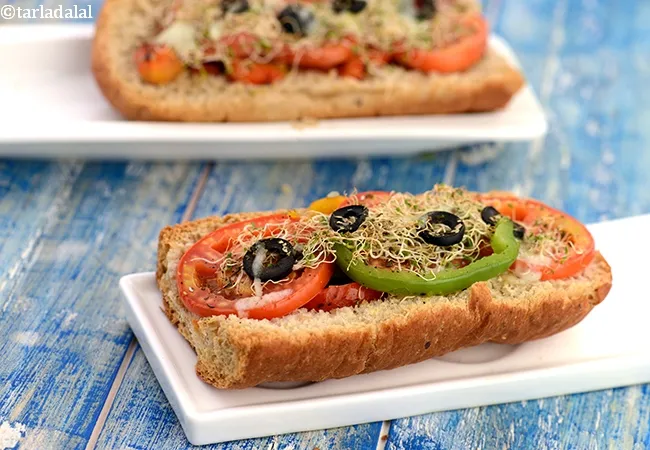 Alfalfa Sprouts Open Sandwich ( Vitamin A and Calcium Rich Recipe )
Alfalfa Sprouts Open Sandwich ( Vitamin A and Calcium Rich Recipe )
Enjoy best sprouts recipes, collection of Indian sprouts recipes and other sprout related articles you will like below:
Sprout for Diabetics Recipes
Sprouted Salads Recipes
Sprouts for Healthy Heart Recipes
Sprouts Snacks Recipes
Sprouts Weight Loss Recipes

sprouted moong salad recipe | moong salad | healthy moong salad | moong veg salad | with 15 … More..
Recipe# 2109
21 November, 2019
calories per serving
healthy moong chaat recipe | moong sprouts chaat | sprouted moong chaat | sprouts chaat for weight loss … More..
Recipe# 5647
15 October, 2020
calories per serving
mixed sprouts salad recipe | healthy sprouts salad | sprouts salad for weight loss | Indian sprouts salad … More..
Recipe# 3983
02 April, 2021
calories per serving
sprouts dhokla recipe | healthy sprouts dhokla | sprouted moong dhokla | sprouts dhokla with spinach | with … More..
Recipe# 5958
16 February, 2020
calories per serving
To make anti aging breakfast platter, combine the sprouted moong, paneer, chilli powder, cumin seeds powder and rock … More..
Recipe# 1858
21 May, 2021
calories per serving
mixed sprouts poha recipe | healthy sprouts poha | breakfast poha | protein poha | with 20 amazing … More..
Recipe# 3273
01 December, 2025
calories per serving
sprouted and boiled matki recipe | boiled matki sprouts for kidney, fatty liver, diabetes, kidney stone, blood pressure … More..
Recipe# 206
25 November, 2019
calories per serving
sprouts toast recipe | mixed sprouts toast | healthy Indian sprouts toast | with 28 amazing photos. sprouts … More..
Recipe# 3857
10 October, 2021
calories per serving
moong sprouts and spring onion tikki recipe | diabetic friendly moong sprouts cutlet | healthy moong tikki | … More..
Recipe# 6367
19 March, 2021
calories per serving
mixed sprouts chaat | indian sprouts chaat | boiled mixed sprouts chaat | with 19 amazing images.Mixed Sprouts … More..
Recipe# 2286
13 September, 2019
calories per serving
calories per serving
sprouted moong salad recipe | moong salad | healthy moong salad | moong veg salad | with 15 … More..
calories per serving
healthy moong chaat recipe | moong sprouts chaat | sprouted moong chaat | sprouts chaat for weight loss … More..
calories per serving
mixed sprouts salad recipe | healthy sprouts salad | sprouts salad for weight loss | Indian sprouts salad … More..
calories per serving
sprouts dhokla recipe | healthy sprouts dhokla | sprouted moong dhokla | sprouts dhokla with spinach | with … More..
calories per serving
To make anti aging breakfast platter, combine the sprouted moong, paneer, chilli powder, cumin seeds powder and rock … More..
calories per serving
mixed sprouts poha recipe | healthy sprouts poha | breakfast poha | protein poha | with 20 amazing … More..
calories per serving
sprouted and boiled matki recipe | boiled matki sprouts for kidney, fatty liver, diabetes, kidney stone, blood pressure … More..
calories per serving
sprouts toast recipe | mixed sprouts toast | healthy Indian sprouts toast | with 28 amazing photos. sprouts … More..
calories per serving
moong sprouts and spring onion tikki recipe | diabetic friendly moong sprouts cutlet | healthy moong tikki | … More..
calories per serving
mixed sprouts chaat | indian sprouts chaat | boiled mixed sprouts chaat | with 19 amazing images.Mixed Sprouts … More..


Related Recipes
Follow US
Recipe Categories
- Vitamin B12 Cobalamin Rich 35 recipes
- Low Calorie, Weight Loss Indian 423 recipes
- Low Cholesterol Indian 314 recipes
- Healthy Indian Breakfast 374 recipes
- Indian Diabetic 564 recipes
- Indian Pregnancy 461 recipes
- Zero Oil Indian 133 recipes
- Iron Rich Indian 268 recipes
- Healthy Indian Acidity 137 recipes
- Healthy Sabzi 108 recipes
- Indian Healthy Veg Snack 276 recipes
- Healthy Heart Recipes 421 recipes
- Healthy Veg Indian Soups 74 recipes
- Calcium Rich Indian 373 recipes
- High Blood Pressure Indian Recipes 104 recipes
- Healthy Indian Salads Recipes 137 recipes
- Low Carb Indian Diet, recipes 163 recipes
- Hypothyroidism Diet 63 recipes
- Arthritis Diet 68 recipes
- High Protein Indian recipes 95 recipes
- Vitamin K Diet 42 recipes
- Fatty Liver Diet 39 recipes
- PCOS 136 recipes
- Gluten Free Veg Indian 197 recipes
- High Fiber 329 recipes
- Indian Cancer Patients 275 recipes
- Jaundice Diet 45 recipes
- Sprouts 61 recipes
- Typhoid 43 recipes
- Irritable Bowel Syndrome (IBS) 23 recipes
- Kidney Stone Diet 10 recipes
- Home Remedies 213 recipes
- Senior Citizen 195 recipes
- Healthy Indian Drinks and Juices 214 recipes
- Diet for Dialysis 10 recipes
- Gout Indian Recipes 17 recipes
- Potassium Rich 80 recipes
- Vegan 195 recipes
- Indian recipes to treat Vomiting 8 recipes
- Forever Young Diet, Anti Aging Indian Diet 255 recipes
- Antioxidant Rich Indian 445 recipes
- Vitamin B1 Rich Indian Foods, Recipes 101 recipes
- High in Omega 3 Fatty Acids 32 recipes
- Zinc Rich Foods 55 recipes
- Vitamin A Rich, Beta Carotene, Retinol 89 recipes
- Malaria Diet 19 recipes
- Magnesium Rich 94 recipes
- Vitamin C Rich Indian recipes 118 recipes
- Healthy Indian Dinner 85 recipes
- Low Veg Glycemic Index 86 recipes
- Lower Blood Pressure Salads 8 recipes
- Healthy Indian Lunch Recipes 29 recipes
- Lactation 25 recipes
- Vitamin E Rich 51 recipes
- Hyperthyroidism Diet 47 recipes
- Vitamin B3, Niacin Rich 41 recipes
- Post Surgery Diet 42 recipes
- Selenium 27 recipes
- Phosphorus Rich Indian Recipes, Foods 74 recipes
- Lower Blood Pressure Desserts Sweets 14 recipes
- Copper 15 recipes
- Foods Rich in Vitamin B2 Riboflavin 22 recipes
- Vitamin B6 Diet 36 recipes
- B Vitamins 231 recipes
- Vitamin B9 Rich Folate 50 recipes
- Marathoners, Endurance Athletes, Triathlete 225 recipes
- Manganese Diet 32 recipes
- Thalassemia 18 recipes
- Detox Water, Fruit Infused Water 42 recipes
- Lactose Free Dairy Free 22 recipes
- Omega 6 Fatty Acids 32 recipes
- Phytonutrients 51 recipes
- Chronic Kidney Disease Indian recipes 12 recipes
- Selenium1 0 recipes
- Quick Snacks / Quick Starters 385 recipes
- Quick Breakfast Indian 131 recipes
- Quick & Easy Indian Sabzi 117 recipes
- Quick Rotis and Parathas 46 recipes
- Quick Indian Sweets 139 recipes
- Quick Stir-Fries 51 recipes
- Quick Vegetarian Indian Soups 72 recipes
- Quick Chutneys 67 recipes
- Quick Vegetarian Rice, khichdi Recipes 56 recipes
- Indian Snacks Under 10 Minutes (Quick Veg Recipes) 44 recipes
- Quick Indian Dips, Gravies & Sauces 105 recipes
- Quick Veg Indian Pizza 17 recipes
- Quick Veg Pasta 25 recipes
- Quick Pickles / Aachar 25 recipes
- Quick Dals / quick Kadhis 29 recipes
- Snacks under 5 minutes 33 recipes
- Quick Healthy Recipes 43 recipes
- Quick Pressure Cooker 46 recipes
- Quick Desserts 48 recipes
- Quick 3 Ingredients 63 recipes
- Quick Indian Desserts 21 recipes
- Quick 4 Ingredients 41 recipes
- Quick 5 Ingredients 42 recipes
- Kids Tiffin Box 319 recipes
- Recipes for Toddlers (1-3 Years) 32 recipes
- Sweet Recipes for Kids 456 recipes
- Recipes for Baby (10 to 12 Months) 17 recipes
- Quick Indian recipes for Kids 72 recipes
- Indian Breakfast Recipes for Kids 194 recipes
- Recipes for Weaning (8 to 9 months) 22 recipes
- Healthy Foods for Kids 196 recipes
- Snack Recipes for Kids 620 recipes
- Recipes Kids can make 36 recipes
- Kids After School 794 recipes
- Kids Jar Snacks 67 recipes
- Finger Foods for Babies, Toddlers and Kids 76 recipes
- Kids Weight Gain 43 recipes
- Kids Wraps and Rolls 23 recipes
- Kids Veg Pasta 27 recipes
- Kids Brain Boosting 68 recipes
- Protein rich food for kids 71 recipes
- Recipes for Weaning 15 recipes
- Kids Pizzas 30 recipes
- Babies, Toddler and Kids Iron Rich Foods 31 recipes
- High Fiber Foods for Kids 40 recipes
- Kids High Energy Indian Foods 103 recipes
- Kids Noodles 37 recipes
- Kids Calcium Rich Indian recipes 92 recipes
- Babies recipes, 6 to 18 months 34 recipes
- Kids Recipes for Increasing Immunity 10 recipes
- Kids Weight Loss 58 recipes
- Teething Recipes for Babies 10 recipes
- Cereals and Pulses for 8 to 9 months Baby 8 recipes
- Weaning foods at 7 months 12 recipes
- Indian Teen 315 recipes
- Starters / Snacks 2139 recipes
- Indian Breakfast 820 recipes
- Main Course Recipes 928 recipes
- Indian Salads 385 recipes
- Indian Desserts , Sweets 985 recipes
- Indian Soups 249 recipes
- Indian Drinks (Chai, Lassi & More) 484 recipes
- Indian Dinner 903 recipes
- Indian Dinner1 0 recipes
- Indian Lunch 829 recipes
- Side Dishes 449 recipes
- Indian Travel Food 433 recipes
- Indian Barbeque1 recipes 22 recipes
- Frozen Foods, Indian Freezer Recipes 67 recipes
- Whole Wheat Recipes 56 recipes
- Indian Comfort Foods 212 recipes
- Dinner Menus 56 recipes
- Easy Indian Veg 70 recipes
- Innovative Indian Recipes 27 recipes
- No Cook Indian 37 recipes
- Advanced Recipes 10 recipes
- Cakes with Eggs 13 recipes
- Microwave 229 recipes
- Oven 619 recipes
- Indian Steamer Recipes 102 recipes
- Kadai Veg 407 recipes
- Indian Barbeque Recipes 43 recipes
- Sizzler tray 15 recipes
- Mixer 566 recipes
- Pressure Cooker 315 recipes
- Tava 647 recipes
- Non-stick Pan 1393 recipes
- Indian Freezer recipes, meals 57 recipes
- Appe Mould 18 recipes
- Pan 223 recipes
- Non Stick Kadai Veg 203 recipes
- kadai Indian 150 recipes
- Refrigerator 176 recipes
- Waffle Indian recipes 6 recipes
- Handi 12 recipes
- Juicer and Hopper 65 recipes
- Grill 31 recipes
- Toaster 21 recipes
- Gas Toaster 8 recipes
- Healthy Indian steamed 73 recipes
- No Cooking Veg Indian 335 recipes
- Vegetarian baked Indian recipes 381 recipes
- Boiled Indian recipes 129 recipes
- Deep Fry 261 recipes
- Indian Tawa 265 recipes
- Shallow Fry Indian 25 recipes
- Microwave1 172 recipes
- Saute 273 recipes
- Indian Pressure Cooker 171 recipes
- Stir-fry 101 recipes
- Roasting 0 recipes
.webp)





















